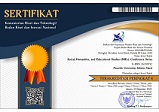Mathematics Learning in the 21st Century: Problem-Based Learning (PBL) and GenAI
Abstract
Mathematics education in the 21st century faces the challenge of developing students' critical and creative skills in addressing complex problems. One increasingly popular approach is Problem-Based Learning (PBL), which focuses on providing real-world problems for students to solve collaboratively. PBL not only introduces students to mathematical concepts but also develops their problem-solving skills, critical thinking, and collaboration. On the other hand, technological advancements, particularly in Generative Artificial Intelligence (GenAI), open new opportunities to support mathematics learning. With its ability to automatically generate content, GenAI can be used to present more dynamic and interactive learning materials, as well as help students explore mathematical concepts in greater depth. This study aims to explore the integration of PBL with GenAI in the context of mathematics education in the 21st century. It is expected that this combination will not only enhance the understanding of mathematical concepts but also prepare students to adapt to the rapid development of technology. This research will discuss the benefits, challenges, and implications of applying these two approaches to improve the effectiveness of mathematics education in schools and universities.
Pendidikan matematika abad ke-21 menghadapi tantangan dalam mengembangkan keterampilan kritis dan kreatif siswa untuk menyelesaikan masalah kompleks. Problem-Based Learning (PBL) menjadi pendekatan populer, karena mengajarkan pemecahan masalah, berpikir kritis, dan kolaborasi melalui masalah dunia nyata. Di sisi lain, kemajuan Generative Artificial Intelligence (GenAI) menawarkan peluang baru dalam mendukung pembelajaran matematika dengan menghasilkan konten secara otomatis, memungkinkan siswa mengeksplorasi konsep matematika secara lebih interaktif. Penelitian ini bertujuan mengeksplorasi integrasi PBL dan GenAI dalam pendidikan matematika. Metode yang digunakan adalah studi literatur untuk menganalisis penerapan kedua pendekatan ini. Hasil menunjukkan bahwa kombinasi PBL dan GenAI dapat meningkatkan pemahaman matematika siswa dan mempersiapkan mereka menghadapi perkembangan teknologi. Namun, tantangan muncul dalam kesiapan teknologi, keterampilan guru, dan infrastruktur yang memadai. Simpulan dari penelitian ini adalah bahwa integrasi PBL dan GenAI berpotensi meningkatkan efektivitas pembelajaran matematika, tetapi memerlukan pelatihan bagi guru dan pengembangan infrastruktur untuk memaksimalkan manfaatnya di sekolah dan perguruan tinggi.
Keywords
Full Text:
PDFReferences
Andriessen, J., & Herraiz, J. (2022). The impact of generative artificial intelligence in personalized learning. Educational Technology & Society, 25(1), 50-64.
Alipour, M., & Moser, D. (2023). Real-time feedback in mathematical learning environments: The role of GenAI. Journal of Educational Technology, 34(4), 112-126.
Barrows, H. S. (2022). Problem-based learning: An overview of its process and impact on learning. Medical Education, 56(2), 115-121. https://doi.org/10.1111/medu.14259
Cakir, M. (2021). Exploring the effectiveness of problem-based learning in the mathematics classroom. Mathematics Education Research Journal, 33(2), 345-362. https://doi.org/10.1007/s13394-021-00345-0
Cavalcanti, D. M., & Mello, M. R. (2020). The use of Problem-Based Learning (PBL) in mathematics education: Challenges and opportunities. International Journal of Mathematical Education in Science and Technology, 51(3), 343-357. https://doi.org/10.1080/0020739X.2020.1750198
Duch, B. J. (2021). Using problem-based learning to enhance student learning in mathematics. Journal of Mathematics Education, 20(2), 57-67. https://doi.org/10.1002/medu.14835
Garrison, D. R., Anderson, T., & Archer, W. (2022). Critical thinking, cognitive presence, and computer-mediated communication: A framework for learning. American Journal of Distance Education, 36(1), 26-41. https://doi.org/10.1080/08923647.2022.2027134
Mason, J., Stephens, M., & Watson, A. (2021). Exploring the role of mathematics in the 21st century: A framework for future learning. Educational Studies in Mathematics, 106(1), 1-14. https://doi.org/10.1007/s10649-020-10050-6
OECD. (2022). PISA 2022: Mathematics literacy in the 21st century. Organisation for Economic Co-operation and Development. Retrieved from https://www.oecd.org/pisa/
Schoenfeld, A. H. (2020). Teaching mathematics through problem-solving: An integrated approach. Educational Studies in Mathematics, 103(1), 1-20.
Sugrue, B., & McCauley, P. (2021). Problem-based learning in mathematics: An investigation of its impact. International Journal of Mathematical Education in Science and Technology, 52(5), 765-783. https://doi.org/10.1080/0020739X.2021.1902549
PISA. (2021). PISA 2021 results: What students know and can do. Organisation for Economic Co-operation and Development. https://www.oecd.org/pisa/
Zhou, L., Zhang, L., & Wang, Y. (2023). Generative AI in education: Revolutionizing learning and teaching practices. Journal of Educational Technology Systems, 51(4), 389-404. https://doi.org/10.1177/00472395231101983
Refbacks
- There are currently no refbacks.





